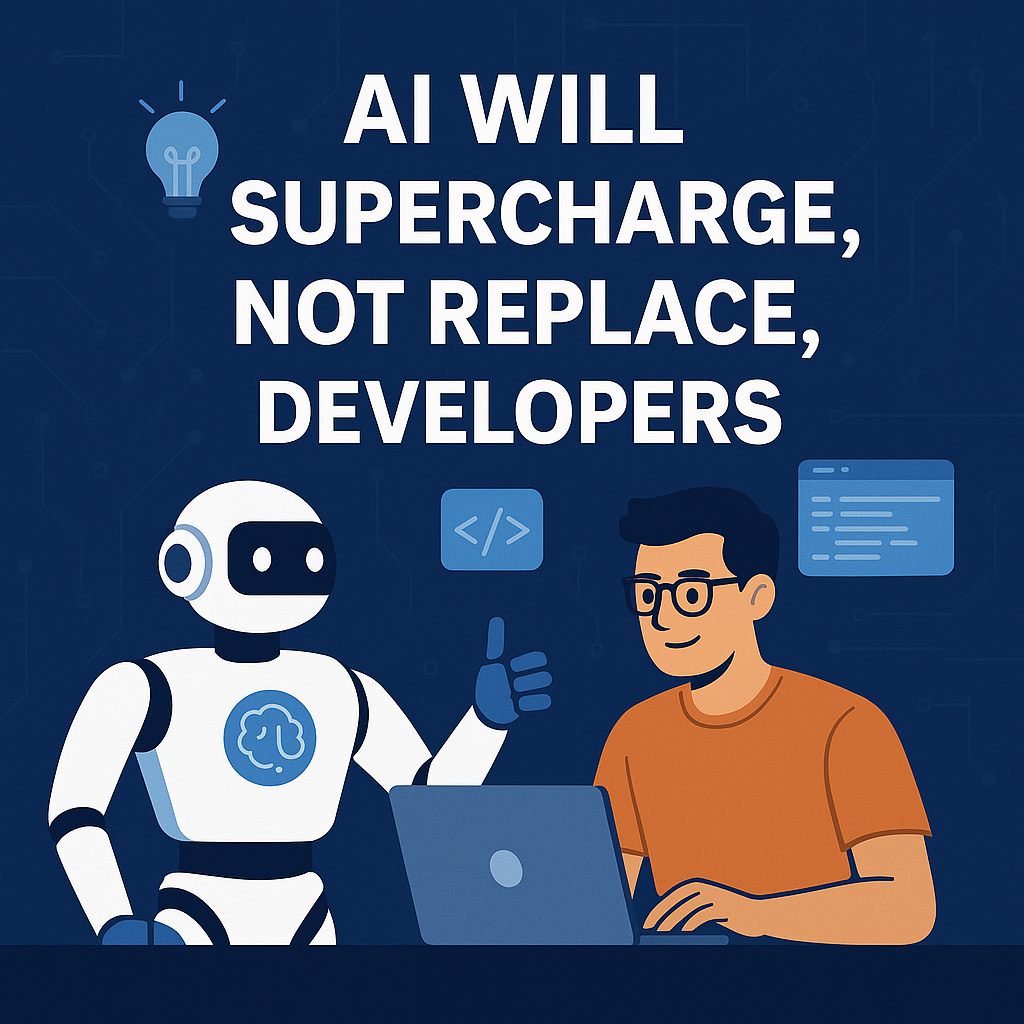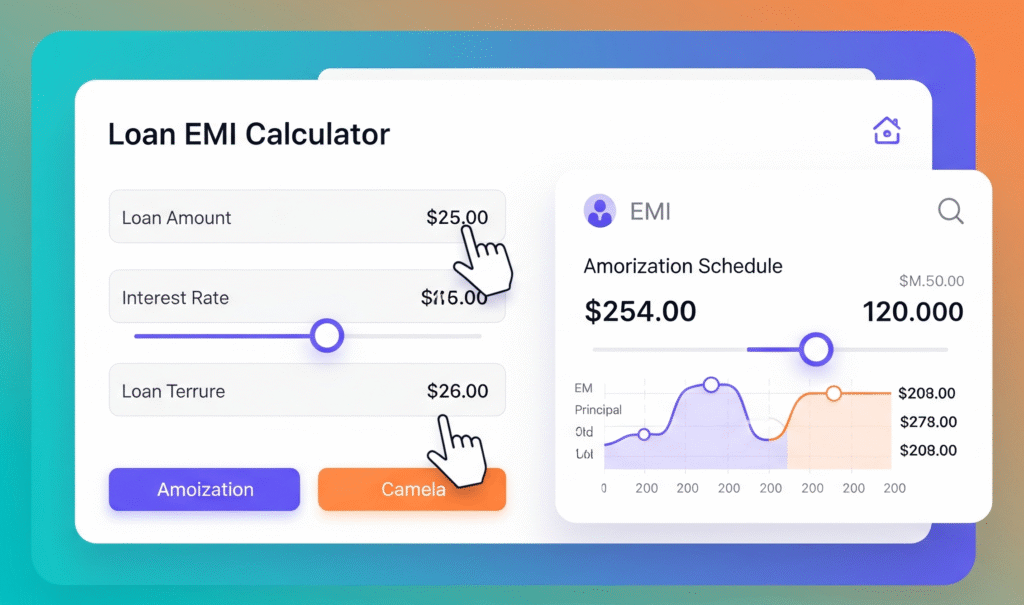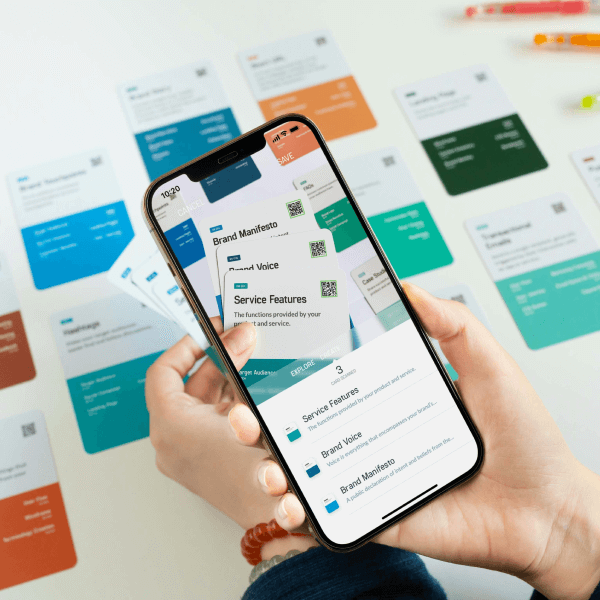“AI will not replace developers. Instead, it will help developers write better software, faster.” – Thomas Dohmke, CEO of GitHub

In today’s fast-paced world of innovation, artificial intelligence (AI) is becoming the engine powering almost every industry. From medicine and manufacturing to transportation and entertainment, AI is changing how we think, work, and build. One area where the effects are especially significant is software development.
In a recent statement that resonated across the tech world, GitHub CEO Thomas Dohmke firmly declared: “AI won’t replace developers – it will supercharge them.” This bold vision challenges the fear-based narrative that AI is here to steal jobs. Instead, it presents AI as a tool – a partner – that enhances human creativity, increases productivity, and empowers developers to do more, not less.
This blog explores the GitHub CEO’s insights, what “supercharging” developers means, and how AI is already transforming the software engineering landscape.
1. Introduction: The AI Buzz and Developer Concerns
The rise of tools like GitHub Copilot, ChatGPT, Amazon CodeWhisperer, and Google Gemini has sparked excitement and anxiety in equal measure. Developers are wondering:
- Will I still have a job in five years?
- Will coding be done entirely by machines?
- Should I even bother learning programming anymore?
The noise around AI often centers on replacement. Headlines proclaim “AI to eliminate coding jobs,” while some suggest programming will be obsolete. But industry insiders – including GitHub’s CEO – are urging a different view. AI is not here to erase developers; it’s here to empower them.
2. Who is Thomas Dohmke and Why His Opinion Matters
Thomas Dohmke is not just another tech executive. As the CEO of GitHub – the world’s largest platform for developers – he oversees over 100 million users and billions of lines of code. GitHub has been at the heart of open-source innovation and software collaboration for over a decade.
Dohmke is also a developer himself. He understands the struggles of building, debugging, and shipping code. His words carry weight because they come from both leadership and lived experience.
3. The Misconception: AI as a Job Killer
Many fear AI in the same way workers feared machinery during the Industrial Revolution. Back then, people thought machines would steal all jobs. Instead, machines changed the nature of work. Jobs didn’t disappear – they evolved.
In the same way, AI is not going to replace developers. It’s going to change what developers do.
Yes, AI can write code, suggest snippets, or even debug. But it doesn’t understand business goals, customer needs, ethical implications, or creative ideas like a human does. Coding is just one part of software development. AI can help with the “doing,” but humans still own the “thinking.”
4. The True Role of AI in Software Development
AI acts as a co-pilot – not a replacement. Think of it like autopilot in airplanes. Pilots are still in charge, but autopilot handles routine tasks so the pilot can focus on what matters most.
- In development, AI helps by:
- Suggesting code based on context
- Catching bugs early
- Generating documentation
- Translating between languages
- Recommending best practices
- Writing unit tests
This frees up developers to focus on architecture, design, and innovation. Instead of being bogged down by boilerplate code or searching Stack Overflow, devs can work smarter and faster.
5. Copilot: A Case Study in Human-AI Collaboration
Launched in 2021, GitHub Copilot is the first widely adopted AI assistant for developers. Powered by OpenAI’s Codex model, it helps generate code based on comments or existing code.
Over time, Copilot has become more context-aware, more accurate, and more widely used. According to GitHub’s internal studies:
- Developers write code up to 55% faster with Copilot.
- Over 50% of code in popular repos now comes from AI suggestions.
- Developers report less frustration and more satisfaction
These results aren’t about replacing the dev. They’re about augmenting the dev.
6. Supercharged Developers: What That Looks Like
So, what does it mean to be “supercharged” by AI?
- A supercharged developer:
- Uses AI to quickly explore multiple solutions
- Focuses on high-level logic, not repetitive tasks
- Writes cleaner, more efficient code
- Builds faster MVPs (Minimum Viable Products)
- Collaborates better with other roles like designers and PMs
- Has more time for learning, mentorship, and innovation
AI acts as an accelerator. It doesn’t do the thinking for you – it gives you leverage to think better and build bigger.
7. Productivity Gains: Real Data, Real Impact
GitHub’s research in collaboration with MIT and Harvard showed dramatic productivity improvements with Copilot:
- Tasks were completed 40-60% faster
- Developers reported less cognitive fatigue
- Teams reported higher quality code reviews and fewer bugs
McKinsey estimates that by 2030, AI could contribute $1 trillion annually in productivity gains in software engineering alone.
This isn’t hypothetical. It’s happening now.
8. AI and the Democratization of Development
One of the most exciting impacts of AI is that it lowers the barrier to entry.
- With tools like Copilot or ChatGPT:
- Beginners can build real-world apps faster
- Non-coders (designers, marketers) can prototype tools
- More people can contribute to open-source projects
This democratization means more diverse ideas, more inclusive products, and broader innovation.
It’s no longer just about who knows the most syntax. It’s about who has the best ideas and uses AI to bring them to life.
9. The Future of Work: Shifting from Coding to Problem-Solving
As AI takes on more of the repetitive coding, developers will shift towards higher-level thinking:
- Understanding user needs
- Designing better UX
- Architecting scalable systems
- Thinking about ethics, privacy, and sustainability
- Integrating new technologies
This means the value of developers will be in their judgment, empathy, and creativity – not just their ability to write perfect loops.
10. Challenges and Limitations of AI in Dev Work
AI is powerful, but it’s not perfect. Developers still need to be critical thinkers.
Here’s why:
- AI can suggest insecure code.
- It may not understand business logic or edge cases.
- It can produce “plausible but wrong” solutions.
- It lacks real-world experience and domain context.
Developers must review, test, and validate everything. AI is not a “set it and forget it” tool.
11. Ethics, Bias, and AI Transparency
With AI writing more code, questions of ethics become crucial:
- Who is responsible if AI code causes harm?
- Are the models trained on copyrighted code?
- Does AI reinforce bias in algorithms?
Developers must lead the way in ethical usage. Transparency, accountability, and explainability must be built into the software.
GitHub and OpenAI are already working on tools that explain AI suggestions, reduce bias, and increase trust.
12. Developer Mindsets Must Evolve
To thrive in the AI era, developers must shift their mindset:
- From gatekeepers of knowledge → to curators of innovation
- From solo coders → to AI collaborators
- From syntax focus → to system thinking
Adaptability is key. The tools may change, but curiosity, problem-solving, and lifelong learning will never go out of style.
13. What Developers Should Focus on in the AI Era
To prepare for the future, developers should:
- Master fundamentals: AI helps with code, but you need to know what the code means.
- Understand AI tools: Learn how to use GitHub Copilot, ChatGPT, or Replit Ghostwriter effectively.
- Practice critical thinking: Always question AI output.
- Stay updated: The field is evolving fast. Follow trends, read research, join discussions.
- Embrace soft skills: Communication, collaboration, and empathy matter more than ever.
14. Conclusion: A New Chapter in Tech Innovation
Thomas Dohmke’s statement – “AI won’t replace developers – it will supercharge them” – is not just a hopeful vision. It’s a call to action.
The age of AI-assisted development is here. And it’s not a threat. It’s an opportunity.
Developers who embrace AI as a creative partner will write better code, build more impactful solutions, and have more meaningful careers. The ones who fear it or ignore it may fall behind.
Just like power tools didn’t replace carpenters – they made them more efficient – AI won’t replace developers. It will give them superpowers.
So, let’s stop asking if AI will take your job. Let’s start asking:
What amazing things will you build with it?




